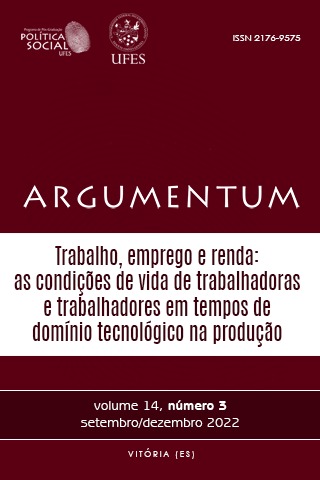Subaltern subjects and (necro)politics to combat COVID-19 in Brazil
DOI:
https://doi.org/10.47456/argumentum.v14i3.34193Abstract
Starting from the concept of necropolitics, this article aims to problematize the way in which public policies to combat COVID-19 in Brazil, throughout 2020, influenced the context of death of subjects historically subalternized in the country. The specific focus of the analyzes was the strategies to encourage social distancing, in addition to emergency aid, considered essential public policies to face COVID-19. In summary, it was noticed that such public policies were implemented in Brazil from an arrangement that caused confusion, information asymmetry and agglomerations of historically subalternizes subjects. Therefore, it was concluded that public policies to combat COVID-19 ended up, in practice, transmuting themselves into necropolitics that amplified the risks of death of subalternized bodies in Brazil, in the context of the COVID-19 pandemic.
Downloads
Downloads
Published
How to Cite
Issue
Section
License
Copyright Transfer Agreement
As a condition for submission, the authors must agree with the Copyright Transfer Agreement, by checking the box after reading the clauses.
The author(s) (hereinafter "AUTHOR") hereby agrees to transfer, without any financial compensation, the property of copyrights regarding Argumentum, a journal of the Postgraduate Program in Social Politics (Programa de Pós-graduação em Política Social), Federal University of Espírito Santo (Universidade Federal do Espírito Santo) - Av. Fernando Ferrari, 514 - Goiabeiras 29075-910, Vitória (Brazil), (hereinafter "ARGUMENTUM"), according to the following terms and conditions:
1. I am aware of the terms of "Care Ethics Research Guide" described in the Policies section.
2. AUTHOR warrants to be the writer and copyright holder of the WORK submitted.
3. AUTHOR declares that the WORK does not infringe the rights of third-parties; that the distribution of images (if existent) was authorized; and that AUTHOR assumes total moral and property responsibility for their content.
4. AUTHOR agrees to transfer all the copyrights concerning the WORK to ARGUMENTUM, especially the rights to edit, publish, translate into another language, and reproduce it through any process or technique. ARGUMENTUM becomes the exclusive owner of the rights regarding the WORK, and any total or partial reproduction, in any other medium, printed or electronic, is strictly forbidden without prior written consent by ARGUMENTUM.
5. The copyright transfer is unpaid and, therefore, there will be no monetary compensation whatsoever by ARGUMENTUM in order to use the TEXT.

